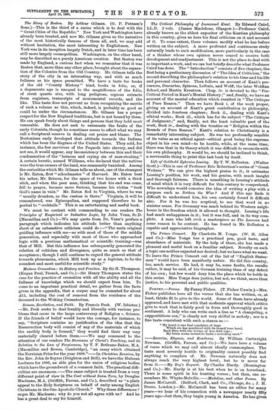The Critical Philosophy of Immanuel Kant. By Edward Caird, LL.D.
2 vols. (James Maclehose, Glasgow.)—Professor Caird, already known as the ablest expositor of the Kantian philosophy in this country, gives us here his final criticism on it and account of it. To some extent, these volumes modify what he has before written on the subject. A more profound and continuous study naturally leads to such modification, more particularly in the case of a thinker whose own opinion never ceased to receive both development and readjustment. This is not the place to deal with so important a work, and we can but briefly describe what Professor Caird has done. The " Introduction " consists of five chapters, the first being a preliminary discussion of "The Idea of Criticism," the second describing the philosopher's relation to his time and his life and personal character. Then follows an account of Kant's pre- cursors, Descartes, Spinoza, Leibniz, and Wolff, the later Wolffian School, and Martin Kreutzen. Chap. iv. is devoted to the " Pre- Critical Period in Kant's Mental History ;" and, finally, we have an account of the mental education which resulted in "The Critique of Pure Reason." Then we have Book i. of the work proper, giving an account of Kant's great contribution to philosophy, divided into fourteen chapters; Book ii., dealing with Kant's ethical works ; Book iii., which has for its subject "The Critique of Judgment ;" and, finally, not the least valuable part of the work, Book iv., dealing with the treatise on "Religion within the Bounds of Pure Reason." Kant's relation to Christianity is a remarkably interesting subject. He was too profoundly sensible of its value as an ethical agent—ethical good being the supreme object in his own mind—to be hostile, while, at the same time, there was that in its theory which it was difficult to reconcile with his own philosophy. It would be, we should be inclined to think, a serviceable thing to print this last book by itself.


















































 Previous page
Previous page